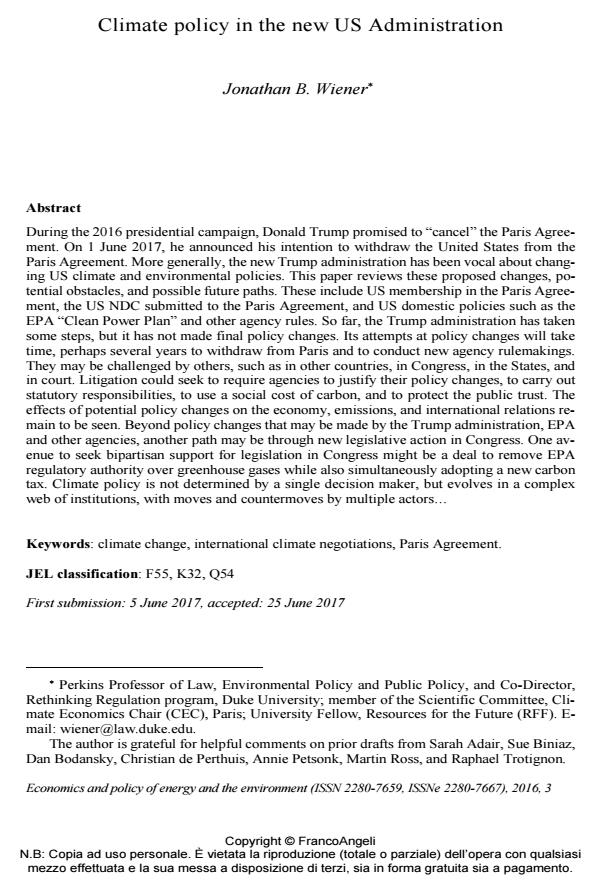Climate policy in the new US Administration
Titolo Rivista ECONOMICS AND POLICY OF ENERGY AND THE ENVIRONMENT
Autori/Curatori Jonathan B. Wiener
Anno di pubblicazione 2017 Fascicolo 2016/3
Lingua Inglese Numero pagine 17 P. 45-61 Dimensione file 202 KB
DOI 10.3280/EFE2016-003004
Il DOI è il codice a barre della proprietà intellettuale: per saperne di più
clicca qui
Qui sotto puoi vedere in anteprima la prima pagina di questo articolo.
Se questo articolo ti interessa, lo puoi acquistare (e scaricare in formato pdf) seguendo le facili indicazioni per acquistare il download credit. Acquista Download Credits per scaricare questo Articolo in formato PDF

FrancoAngeli è membro della Publishers International Linking Association, Inc (PILA)associazione indipendente e non profit per facilitare (attraverso i servizi tecnologici implementati da CrossRef.org) l’accesso degli studiosi ai contenuti digitali nelle pubblicazioni professionali e scientifiche
During the 2016 presidential campaign, Donald Trump promised to "cancel" the Paris Agreement. On 1 June 2017, he announced his intention to withdraw the United States from the Paris Agreement. More generally, the new Trump administration has been vocal about changing US climate and environmental policies. This paper reviews these proposed changes, potential obstacles, and possible future paths. These include US membership in the Paris Agreement, the US NDC submitted to the Paris Agreement, and US domestic policies such as the EPA "Clean Power Plan" and other agency rules. So far, the Trump administration has taken some steps, but it has not made final policy changes. Its attempts at policy changes will take time, perhaps several years to withdraw from Paris and to conduct new agency rulemakings. They may be challenged by others, such as in other countries, in Congress, in the States, and in court. Litigation could seek to require agencies to justify their policy changes, to carry out statutory responsibilities, to use a social cost of carbon, and to protect the public trust. The effects of potential policy changes on the economy, emissions, and international relations remain to be seen. Beyond policy changes that may be made by the Trump administration, EPA and other agencies, another path may be through new legislative action in Congress. One avenue to seek bipartisan support for legislation in Congress might be a deal to remove EPA regulatory authority over greenhouse gases while also simultaneously adopting a new carbon tax. Climate policy is not determined by a single decision maker, but evolves in a complex web of institutions, with moves and countermoves by multiple actors
Parole chiave:Climate change, international climate negotiations, Paris Agreement.
Jel codes:F55, K32, Q54
- The Paris Agreement and the "free rider" Christian de Perthuis, in ECONOMICS AND POLICY OF ENERGY AND THE ENVIRONMENT 3/2017 pp.31
DOI: 10.3280/EFE2016-003003
Jonathan B. Wiener, Climate policy in the new US Administration in "ECONOMICS AND POLICY OF ENERGY AND THE ENVIRONMENT" 3/2016, pp 45-61, DOI: 10.3280/EFE2016-003004